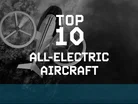
They say ‘the sky’s the limit’ and the EV sector took that personally. Aviation businesses are working towards creating electric aircraft that can transport people and cargo, for business and pleasure.
Here are our Top 10 electric aircraft that are shaking up the sector.
10. Solar Impulse
Solar-powered aeroplane Solar Impulse 2 has 17,000 solar cells on its wings. It completed the first round-the-world flight from Abu Dhabi, in 2016. Pilot Bertrand Piccard had spent 15 years on the project.
“Solar Impulse has flown more than 40,000 kilometres without fuel, but with an inexhaustible supply of energy and inspiration,” said Ban Ki-moon, the UN secretary-general. “You may be ending your around the world flight today, but the journey to a more sustainable world is just beginning. The Solar Impulse team is helping to pilot us to that future.”
9. Airbus E-Fan
In 2022, AirBus’ revenue hit €58.8bn (US$65bn) and employed a workforce of around 134,000.
Launched in 2017, the hybrid-electric Airbus E-Fan aircraft is an important part of Airbus’ decarbonisation journey. The serial hybrid-electric propulsion system is the first of its kind and has set in motion the industry-wide adoption of alternative-propulsion commercial aircraft.
8. Sunseeker Duo, Solar Flight
The Sunseeker Duo is Solar Flightʼs third solar powered aeroplane, with a wingspan of 22 metres and an empty weight of 280 kg, its 1510 solar cells have 23% efficiency. The aeroplane can cruise on solar power.
Irena Raymond became the second pilot of the DUO and has made ten solo flights in it.
“The key factor is being efficient enough to slowly climb on direct solar power,” she explains. “Then with patience you can get very high.”
7. The Cessna Grand Caravan EX, Textron Aviation Company
The Cessna Grand Caravan EX aircraft is recognised by regional airlines and charter operators, as well as cargo carriers, for being dependable and efficient. It is designed for high payloads and short runways, with its increased speed and climb capability.
The Grand Caravan® EX aircraft can carry up to 14 occupants and delivers 867 horsepower, with low direct operating costs.
6. Lange Antares 23, Lange Aviation
Lange Aviation specialises in the development of top-quality electric propulsion systems. The Antares 23 is manufactured with composite materials to make it lightweight and aerodynamically efficient. The aircraft also has a 23 metre wingspan and a cockpit equipped with modern navigation systems, offering control interfaces for safe flying.
In addition, its retractable engine allows the glider to take off without the need for a tow plane.
5. CityAirbus
CityAirbus is gifted with various innovative design elements, such as fixed wings, a V-shaped tail and eight electric-powered propellers, as part of its distributed propulsion system. Designed for a quiet flight and use in urban environments, Airbus believes that urban and advanced mobility can ‘be moved into the sky to provide communities with additional ways to reach their destination’.
On the horizon, CityAirbus NextGen will use in-house and externally supplied components, ready for commercial use, as well as medical services and ecotourism.
4. MacCready Solar Challenger, AeroVironment
For 50 years AeroVironment has devoted itself to simple solutions and innovative design, to meet the needs of military and commercial customers. The company is headquartered in Arlington, Virginia, and uses future defining technologies from robotics to sensors, software analytics to connectivity, to manufacture its aircraft.
The MacCready Solar Challenger completed a manned solar-powered flight across the English Channel in 1981, led by aeronautical engineer Paul MacCready.
3. Lange Antares 20E
Another entry from Antares, the 20E is a high-performance self-launching sailplane. Again, composite materials are used in the manufacturing process to make the aircraft lightweight.
“The peak climb rate is in excess of 800 fpm,” said Dave Nadler, North American distributor for Antares. On a windy day, >20 knots at altitude, he only spent 15% of the time circling. “Mostly I flew straight following energy lines.”
2. NASA X-57 Maxwell
The X-57 “Maxwell” is NASA’s first all-electric aircraft, known as an X-plane, aims to share the aircraft’s electric-propulsion-focused design with regulators, in order to advance certification for electric propulsion in the electric aircraft market.
This design driver includes a 500% increase in high-speed cruise efficiency, zero in-flight carbon emissions and flight that is much quieter for the community on the ground.
1. Taurus Electro, Pipistrel
The CEO of Pipistrel, Ivo Boscarol, is the 10th richest Slovenian and made the 2015 list of the most influential Europeans. Ivo and the Pipistrel team built the world’s first fully electric 2-seat aircraft, the Taurus Electro. Flying on 35 kW horsepower and 82 kts max cruise, the aircraft offers a spacious and comfortable cabin (views differ). The aircraft can fly on a shorter runway, climb quickly and perform better than its gasoline-powered version at high altitude. It has two buttons, “on” and “off”. When it reaches 2,000 metres altitude, the engine retracts and the aircraft becomes a sailplane. The maintenance cost is 70 cents per hour, making it up to ten times cheaper than its rivals.
*******************
Make sure you check out the latest edition of EV Magazine and also sign up to our global conference series - Sustainability LIVE 2024.
*******************
EV is a BizClik brand.




